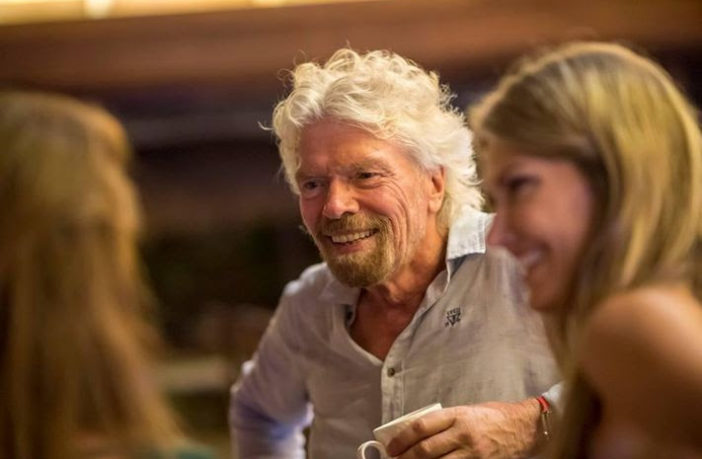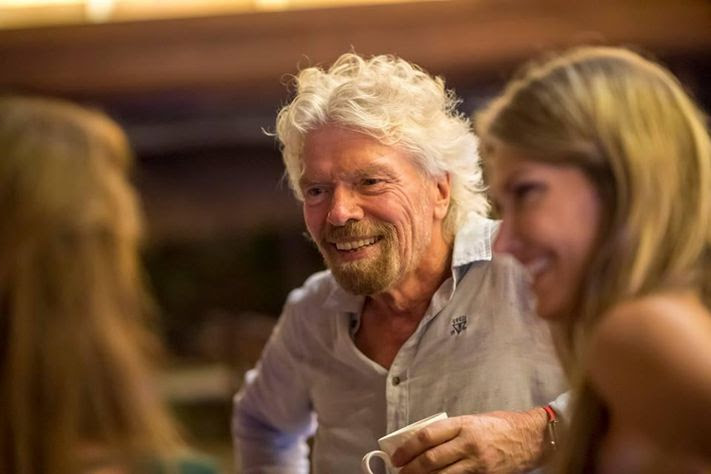Forbes
Michael del Castillo
Richard Branson at Necker Island for the 2017 Blockchain Summit.Bitfury
In the aftermath of Hurricane Irma, the leaders behind the Blockchain Summit, normally hosted at Richard Branson’s own personal Necker Island, saw an opportunity. The Category 5 storm that destroyed the retreat and thousands of private residences last year forced the event’s cohosts to reevaluate its setting, and they wanted to do so with a sense of purpose.
In spite of a number of real-world results that have emerged from the conference, including the creation of the Blockchain Alliance, which now includes 36 government agencies, and the Global Blockchain Business Council, with members from 35 countries, the gathering has become an easy target on social media because of the perception that it is little more than a vacation for the well-to-do.
So, in this, the fourth year of the event, investor Bill Tai, the man who came up with the concept in the first place, wanted to create a new layer of meaning beyond just getting a number of thought leaders together to see how they could use the technology made popular by bitcoin to bring new efficiencies to a wide range of industries.
In addition to gathering participants including Google cofounder Sergey Brin and Kenyan cabinet secretary Joseph Mucheru, Tai invited about 30 speakers to Richard Branson’s Kasbah Tamadot in Marrakesh, Morocco, to talk about the business of building blockchain in Africa.
“The whole continent is a bit of an unknown to a lot of folks because they just don’t get much exposure to it,” says Tai, who is also the founder of the Actai Group, a nonprofit aimed at bringing together groups of leaders for social good. “I think getting a lot of people together who are knowledgeable, with reach and a high profile, that collectively can form a view about what are the opportunities at hand that can both serve philanthropic and commercial interests.”
Helping lead the shift in focus to using blockchain as a way to more deeply connect the rest of the world’s finances to Africa is Tai himself, who in addition to being an early investor in the blockchain firm Bitfury Group, one of the event’s co-hosts, is expected to make a series of related announcements on stage at the event.
Specifically, on July 9, Tai says, he’ll announce a project called Barking Dog, which is being designed to help national governments without land-titling infrastructures easily use blockchain to recognize the land their citizens own and tokenize the assets beneath it. Inspired by economist Hernando De Soto, who used land-titling to prevent the growth of illegal crops in South America, the Barking Dog initiative is part of a larger push to register land in Africa and around the world.
Already, Ghana-based Bitland and Kenya-based Land Layby are working to use blockchain to create formally recognized infrastructures for proving land ownership. While the problem of proving ownership may be foreign to many in the West, the World Economic Forum estimates that 90% of Africa’s land is “completely” undocumented. More than just a real-estate issue, Tai argues, empowering people with land ownership is a crucial component to financial independence and broader blockchain building.
“If you have a squatter versus somebody with a title, the squatter just wants to take, take, take, and then run away if the law comes,” Tai says. “If you own the land with a clear title you want to make it better, you want to improve it.”
Also expected to be announced at the event is a unique crypto collectible issued on the ethereum blockchain called a CryptoKitty, which will be auctioned off to the highest bidder. Tai is working with a small team of developers to explore how the genetic material of endangered animals in Africa and elsewhere around the world could be associated with similar assets logged on a blockchain. In turn, those assets could be purchased by bidders, or on an open market, as a way to compensate locals who might otherwise rely on the animals for their livelihood.
Lastly, Bitfury, Tai’s portfolio company, is expected to reveal a project called Bitfury Educational Blockchain Initiative for Good in partnership with cryptocurrency advocacy firm Coin Center to translate the bitcoin white paper into other languages, including Swahili, spoken by 140 million people in Kenya, Mozambique, Rwanda and Somalia.
But simply giving access to the first paper to describe a blockchain to this relatively small group of people isn’t enough, according to another summit speaker, Joseph Mucheru, the Kenyan cabinet secretary, whose Ministry of Information, Communications, and Technology is also a member of the Blockchain Alliance. Mucheru, who previously worked as the head of Google’s sub-Sahara operations, says blockchain innovation needs to come from within his home continent and stay there.
The problem he sees is twofold. First is a swath of startups founded in Africa that are being acquired by Western nations for fractions of what they would pay for similar technology developed elsewhere. In addition to working with regulators to keep blockchain startup revenue flowing into the nation by incentivizing these startups to list on the Nairobi Securities Exchange, Mucheru says he wants to help more young African coders learn how to write blockchain code as a matter of preserving their culture itself.
For example, Mucheru pointed to Microsoft, which typically targets its products to only two African languages—Afrikaans and Swahili—of the thousands that are spoken on the continent, while the software giant has just as many dialects of the invented Klingon language from Star Trek. “They’re not required by law that they have to do anything for Africa, so it’s not that it’s their fault,” says Mucheru. “But if we don’t do something about it then we’re going to be completely left behind.”
One of the cryptocurrency companies Mucheru says he’s hopeful might someday go public in Kenya is Nairobi-based BitPesa, a bitcoin payments firm in which he was also an early investor. (He divested his shares when he took the government position three years ago.) Founded in 2013, BitPesa was among the first wave of bitcoin startups and has since grown to 70 employees, half of which are women and 75% of which come from African nations, including Kenya, Nigeria, Ghana, Senegal, Cameroon and Uganda.
Last year, the firm raised an additional $2.5 million in venture capital led by Graycroft Partners, and was managing$10 million a month, with a 25% month-over-month growth rate. Also a member of the Blockchain Alliance, BitPesa founder Elizabeth Rossiello says it is growth like this that helped lead to the decision to move the summit to Africa.
“They’re not moving here as a favor. They’re moving here because there’s opportunity,” she says. “They’re moving here because companies have scaled here.”
But if blockchain does ever scale in Africa, the resulting startups will eventually have to plug into the existing infrastructure and supply chains, according to Tanya Stephens, the head of P&G’s global center of excellence on blockchain. On the second day of the four-day summit, Stephens will be joining Mucheru, Rossiello, Senegalese musician Akon and others on a live-streamed panel about the role blockchain can play in more deeply connecting Africa’s economy with the rest of the world.
“We are seeing a bit of a shift,” says Stephens, who works in the exponential innovation division of P&G, which did $66.4 billion in sales last year. “We’ve done mass media for a very, very long time, and so now there’s a shift with technologies like this that are peer-to-peer, and we’re exploring what the potential is.”
As part of that exploration, Tai and the other event organizers built free time into the agenda to visit the local villages, take Moroccan cooking lessons, and visit the Eve Branson Foundation, which is dedicated to supporting education and creating job opportunities for the local Berber people.
Beyond the potential humanitarian benefits of using blockchain to help connect Africa’s unbanked and underbanked to the global economy, Tai believes that the business benefits to the global community could someday rival the impact that China has had over the past decade. That is, if blockchain developers both on the continent and off are exposed to the opportunity.
“There’s a lot of energy in the blockchain segment, for sure. The question is, how do you apply it?” Tai says. “And you’re not going to apply to areas you haven’t touched, you haven’t heard about. So we got a lot of interesting people that have big voices and a lot of reach that can see—hopefully, they’ll experience—an environment where they’ll be able to gauge first-hand what are the opportunities here.”
Building A Workforce By Putting Tools Back In Students’ Hands
photo
Harbor Freight Tools, the national hardware retailer, is addressing a significant gap between skilled workers and open positions in the trades through its philanthropic support of career and technical education programs.
With a broad swath of the nation’s hard-working trade laborers entering retirement, it will be up to our career and technical education (CTE) providers to supply their most valuable product, skilled workers.
Harbor Freight Tools wants to ensure that these programs have the support to continue training this vital workforce. That’s why Harbor Freight Tools CEO Eric Smidt and the Smidt Foundation launched Harbor Freight Tools for Schools (HFTS). Since 2013, HFTS has given millions of dollars in donated tools, supplies and grants to underfunded programs around the country.
Skilled workers are highly prized and well-compensated. These jobs remain a significant career pathway to the middle class for students who do not plan on attending a four-year college. Plumbers and electricians, for example, can earn on average between $52,000 and $54,000, according to the Bureau of Labor Statistics.
However, the scale at which CTE schools supply talent pipelines to replace retiring workers is not enough to meet this demand. Declining interest in these programs and budget cutbacks, especially at the high school level, threaten to curtail the flow of new workers into the trades when we need them the most.
One sector that is projected to grow faster than the national average is construction. The industry was hit hard by the Great Recession and shed more than 1.5 million jobs. Though construction hiring has climbed, it hasn’t recovered to its previous strength.
Area Development reported findings from USG + U.S. Chamber of Commerce Commercial Construction Index which said that 65 percent of small contractors had difficulties finding skilled workers. Despite an uptick in construction hiring this year, the tight labor market is one of the leading factors contributing to a housing shortage.
Harbor Freight Tools for Schools made a huge splash with its first donation of $1.5 million in tools and equipment for the Los Angeles Unified School District.Harbor Freight Tools for Schools
To combat this shortage, Harbor Freight Tools for Schools developed partnerships with Big Picture Learning, Real World Scholars and the Ventura County Office of Education Career Learning Center. These partnerships were made to enhance current CTE programs and attract more students who want to pursue alternative career pathways.
In 2017, the organization created the Harbor Freight Tools for Schools Prize for Teaching Excellence. WorkingNation has shared their video of the three winners: Bob Kilmer of Enumclaw High School; Brendan Malone of Urban Assembly New York Harbor and Jonathan Schwartz of Colfax High School accepting the $100,000 award. In total, more than $500,000 was given to 10 CTE programs and teachers.
WorkingNation celebrates the companies that are making a difference in supporting CTE programs. We have highlighted the partnership between Snap-on Inc. and Gateway Technical College which provides state-of-the-art tools and equipment to train automotive mechanics. Our filmmakers also have featured the advanced manufacturing and 3D-printing training program offered by NC3 and Dremel.
We look forward to seeing what the future holds for Harbor Freight Tools for Schools and their next venture.
To learn more about the organization, click here.
Matthew Parke is the Digital Content Producer for WorkingNation, a nonprofit storytelling organization highlighting solutions for workforce development and education.








